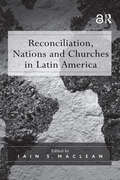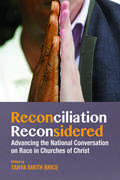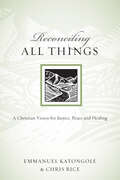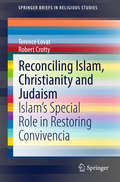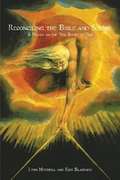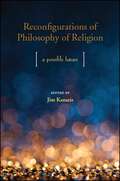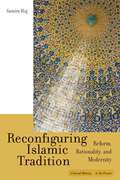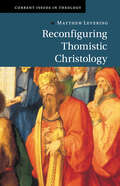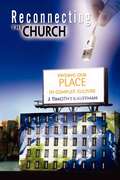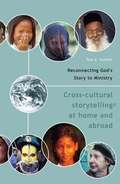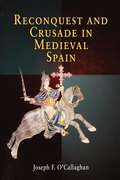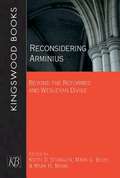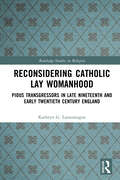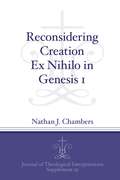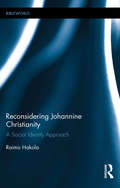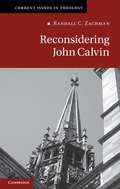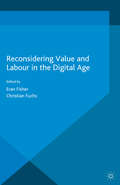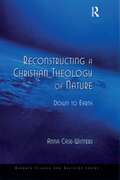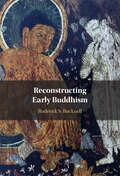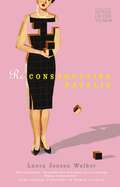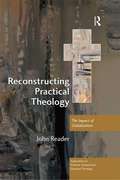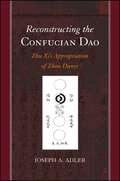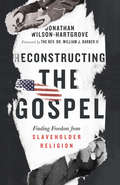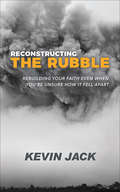- Table View
- List View
Reconciliation, Nations and Churches in Latin America
by Iain S. MacleanThis book examines the recent phenomenon in Latin America of national Truth and Reconciliation commissions. Few studies have examined the role of Churches or religion in political processes that proclaim valued theological terms as their agenda - truth, forgiveness, and reconciliation. This book questions the role of religion, specifically of established Churches. The impact of such reconciliation commissions on Indigenous Native Americans is also examined, as is the role of women and how both commissions and Churches or religions were challenged by their experiences. The contributors offer differing perspectives on one or more national truth and reconciliation processes and thus offer a collection that serves as valuable source for the disciplines of Religious Studies, Ethics, Theology, Political Science, Social Sciences and Women's Studies.
Reconciliation Reconsidered: Advancing the National Conversation on Race in Churches of Christ
by Tanya Smith BriceReconciliation Takes Time.A broad racial divide mars Churches of Christ, and courageous leaders from across the United States have joined together to listen to one another. Rather than adopt a posture of resignation, they have met for honest, God-honoring conversation.In Reconciliation Reconsidered, Tanya Brice pulls together the early fruit she has gleaned from this ongoing conversation about racial reconciliation. Learn about yourself in the context of community as you explore these key ideas:•Exercise truth-telling: it's what is needed before any reconciliation can happen•Discover how race relations are not as simple as you think•Challenge your stereotypes•Understand the meaning of current events like the Ferguson shooting in fresh ways•Revisit Christ's teachings with a careful eye toward discipleship and love of your neighbor•Each chapter concludes with discussion questions that can help you and others navigate this perplexing and difficult topic.
Reconciling All Things: A Christian Vision for Justice, Peace and Healing (Resources for Reconciliation)
by Chris Rice Emmanuel KatongoleChristianity TodayOur world is broken and cries out for reconciliation.But mere conflict resolution and peacemaking are not enough. What makes real reconciliation possible? How is it that some people are able to forgive the most horrendous of evils? And what role does God play in these stories? Does reconciliation make any sense apart from the biblical story of redemption?Reconciling All ThingsThis powerful, concise book lays the philosophical foundations for reconciliation and explores what it means to pursue hope in areas of brokenness in theory and practice.
Reconciling Islam, Christianity and Judaism
by Terence Lovat Robert CrottyAt the present time, when so-called Islamic radicalism, terrorism and Jihadism occupy major media space, with Islam often depicted as the main culprit, the book attempts a tour de force. It proposes that Islam is as much victim as culprit in the history that has led to the current hostility. This is because the common claims of both mainstream and radical Islam that Islam represents the high point of the Abrahamic tradition, and therefore a purification of Judaism and Christianity, have been largely ignored, misunderstood or blatantly rejected by these faiths and therefore by 'the West' in general. This rejection has effectively rendered Islam as the poor cousin, if not the illegitimate sibling, of the tradition. In turn, this has created long-term resentment and hostility within Islam as well as robbed the 'Judaeo-Christian West' of a rich, inter-faith understanding of the wider Abrahamic tradition. The book explores these claims through textual, historical and theological analyses, proposing that many of them stand up better to critical scrutiny than has been commonly acknowledged. It further proposes that seeing Islam in this way has potential to re-awaken its self-understanding as a leader of accord among the Abrahamic faiths, of the kind that characterized the era of Convivencia when, in medieval Spain, Islam constructed and contributed to advanced civilizations characterized by relatively harmonious co-existence between Muslims, Christians and Jews. The book focuses on the role that a more respected and self-confident Islam could play in forging enhanced inter-faith relations in a world that desperately needs them as it struggles to understand and deal with modern and particularly vicious forms of radical Islamism.
Reconciling the Bible and Science: A Primer on the Two Books of God
by Kirk Blackard Lynn MitchellReconciling the Bible and Science acknowledges the Bible as the word of God, demonstrates why there is no conflict between the Bible and science, and shows readers how to accept both.
Reconfigurations of Philosophy of Religion: A Possible Future
by Jim KanarisThis collection addresses, as it exemplifies, an identity crisis in contemporary philosophy of religion. It represents a unique two-way dialogue between philosophers of religion and scholars of religion and broaches issues pertaining to the philosophy of religion and the philosophical tradition, on the one hand, and religious studies, theology, and the modern academy on the other. While each author manages the current challenges in philosophy of religion differently, one can nonetheless discern a polyphony of interests surrounding a postcritical, postsecular appreciation of religion. In part 1, contributors ask how philosophy of religion can accommodate both the strengths and weaknesses of Western analytic and continental traditions; incorporate developments in ideology critique, gender studies, and Asian philosophies; and negotiate the perceived stalemate in philosophy of religion. Part 2 addresses these questions in terms of a philosophy of religion that is postcolonial in intention and multidisciplinary in orientation and features scholarship from the fields of both religion and theology. An underlying theme is the importance of ushering philosophy of religion into a postphenomenological era of religious studies and theology. This is a neglected dimension in many laudable discussions about philosophy of religion that this volume hopes to emend.
Reconfiguring Islamic Tradition
by Samira HajHaj (history, City U. of New York-Graduate Center) analyzes the work of two significant Muslim reformers that many consider to have inspired the two major strands of contemporary Islamic political thought. One is Muhammed ibn Abdul Wahhab (1703-87), whose work inspires groups like al-Qa'ida; the second is Egyptian reformer Muhammad 'Abduh (1849-1905). Western scholarship labels the first fundamentalist and traditional, and the second liberal and modern, but he looks at both of their ideas in terms of their own political goals, not that of Western powers. Annotation ©2009 Book News, Inc. , Portland, OR (booknews. com)
Reconfiguring Thomistic Christology (Current Issues in Theology)
by Matthew LeveringIn this book, Matthew Levering unites eschatologically charged biblical Christology with metaphysical and dogmatic Thomistic Christology, by highlighting the typological Christologies shared by Scripture, the Church Fathers, and Aquinas. Like the Church Fathers, Aquinas often reflected upon Jesus in typological terms (especially in his biblical commentaries), just as the New Testament does. Showing the connections between New Testament, Patristic, and Aquinas' own typological portraits of Jesus, Levering reveals how the eschatological Jesus of biblical scholarship can be integrated with Thomistic Christology. His study produces a fully contemporary Thomistic Christology that unites ressourcement and Thomistic modes of theological inquiry, thereby bridging two schools of contemporary theology that too often are imagined as rivals. Levering's book reflects and augments the current resurgence of Thomistic Christology as an ecumenical project of relevance to all Christians.
Reconnecting The Church
by J. Timothy KauffmanReconnecting the Church is offered as a practical guide to assist pastors and laypeople in understanding the city, engaging, and serving the local community in which the church is located. The book’s purpose is to come along side the local church that wishes to reconnect to its local community, and offer practical ways to accomplish that task. There are 25 chapters each of which describes briefly an aspect of life in the city. At the end of each chapter are practical action/reflection projects. These projects are designed to give the reader first-hand experience of their church’s immediate neighborhood. They are specific tasks, most of which will be done outside the church. Each action is described, and guidance is given for reflection after each project.
Reconnecting God's Story to Ministry: Cross-Cultural Storytelling at Home and Abroad
by Tom A. SteffenThis book will introduce practical ways to increase many of the storytelling skills for evangelism-discipleship among those of like culture.
Reconquest and Crusade in Medieval Spain
by Joseph F. O'CallaghanDrawing from both Christian and Islamic sources, Reconquest and Crusade in Medieval Spain demonstrates that the clash of arms between Christians and Muslims in the Iberian peninsula that began in the early eighth century was transformed into a crusade by the papacy during the twelfth and thirteenth centuries. Successive popes accorded to Christian warriors willing to participate in the peninsular wars against Islam the same crusading benefits offered to those going to the Holy Land. Joseph F. O'Callaghan clearly demonstrates that any study of the history of the crusades must take a broader view of the Mediterranean to include medieval Spain.Following a chronological overview of crusading in the Iberian peninsula from the late eleventh to the middle of the thirteenth century, O'Callaghan proceeds to the study of warfare, military finance, and the liturgy of reconquest and crusading. He concludes his book with a consideration of the later stages of reconquest and crusade up to and including the fall of Granada in 1492, while noting that the spiritual benefits of crusading bulls were still offered to the Spanish until the Second Vatican Council of 1963.Although the conflict described in this book occurred more than eight hundred years ago, recent events remind the world that the intensity of belief, rhetoric, and action that gave birth to crusade, holy war, and jihad remains a powerful force in the twenty-first century.
Reconsidering Arminius: Beyond the Reformed and Wesleyan Divide
by Keith D. Stanglin Mark G. Bilby Mark H. MannThe theology of Dutch theologian Jacob Arminius has been misinterpreted and caricatured in both Reformed and Wesleyan circles. By revisiting Arminius's theology, the book hopes to be a constructive voice in the discourse between so-called Calvinists and Arminians. Traditionally, Arminius has been treated as a divisive figure in evangelical theology. Indeed, one might be able to describe classic evangelical theology up into the twentieth century in relation to his work: one was either an Arminian and accepted his theology or one was a Calvinist and rejected his theology. Although various other movements within evangelicalism have provided additional contour to the movement (fundamentalism, Pentecostalism, etc.), the Calvinist-Arminian 'divide' remains a significant one. What this book seeks to correct is the misinterpretation of Arminius as one whose theology provides a stark contrast to the Reformed tradition as a whole. Indeed, this book will demonstrate instead that Arminius is far more in line with Reformed orthodoxy than popularly believed and show that what emerges as Arminianism in the theology of the Remonstrants and Wesleyan movements was in fact not the theology of Arminius but a development of and sometimes departure from it. This book also brings Arminius into conversation with modern theology. To this end, it includes essays on the relationship between Arminius's theology and open theism and Neo-Reformed theology. In this way, this book fulfills the promise of the title by showing ways in which Arminius's theology--once properly understood--can serve as a resource of evangelical Wesleyans and Calvinists doing theology together today. Editors: Keith D. Stanglin, Mark G. Bilby, and Mark H. Mann Contributors: Jeremy Dupertuis Bangs Mark G. Bilby Oliver D. Crisp W. Stephen Gunter John Mark Hicks Mark H. Mann Thomas H. McCall Richard A. Muller Keith D. Stanglin E. Jerome Van Kuiken
Reconsidering Catholic Lay Womanhood: Pious Transgressors in Late Nineteenth and Early Twentieth Century England (Routledge Studies in Religion)
by Kathryn G. LamontagneThis book offers a new perspective on the often-overlooked lives of lay women in the English Roman Catholic Church. It explores how over a century ago in England some exceptional Catholic lay women – Margaret Fletcher, Maude Petre, Radclyffe Hall, and Mabel Batten - negotiated non-traditional family lives and were actively practicing their faith, while not adhering to perceived structures of femininity, power, and sexuality. Focusing on c. 1880-1930, a time of dynamism and change in both England and the Church, these remarkable women represent a rethinking of what it meant to be a lay women in the English Roman Catholic Church. Their pious transgressions demonstrate the multiplicity of ways lay women powerfully asserted aspects of their faith while contravening boundaries traditionally assumed for them in an ostensibly patriarchal religion. In fact, the Church could be a place for expressions of unconventional religiosity and reinterpretations of womanhood and domesticity. Connecting together the lives of these women for the first time, this work fills a lacuna in the scholarship of modern Catholic and gender history. Drawing from private collections and numerous archives, it illustrates the surprising range of modes of Lived Catholicism and devotion to faith. Students and scholars of Catholicism, gender, and LGBTQIA+ studies will find significant merit in a book that assigns lay women a more prominent role in the English Catholic Church and offers examples of the flexibility of Roman Catholicism.
Reconsidering Creation Ex Nihilo in Genesis 1 (Journal of Theological Interpretation Supplements #19)
by Nathan J. ChambersThere is a broad consensus among biblical scholars that creation ex nihilo (from nothing) is a late Hellenistic concept with little inherent connection to Genesis 1 and other biblical creation texts. In this book, Nathan J. Chambers forces us to reconsider the question, arguing in favor of reading this chapter of the Bible in terms of ex nihilo creation and demonstrating that there is a sound basis for the early Christian development of the doctrine.Drawing on the theology of Augustine of Hippo and Thomas Aquinas, Chambers considers what the ex nihilo doctrine means and does in classical Christian dogma. He examines ancient Near Eastern cosmological texts that provide a potential context for reading Genesis 1. Recognizing the distance between the possible historical and theological frameworks for interpreting the text, he illuminates how this doctrine developed within early Christian thought as a consequence of the church’s commitment to reading Genesis 1 as part of Christian Scripture. Through original close readings of the chapter that engage critically with the work of Jon Levenson, Hermann Gunkel, and Brevard Childs, Chambers demonstrates that, far from precluding interpretive possibilities, reading Genesis 1 in terms of creation from nothing opens up a variety of interpretive avenues that have largely been overlooked in contemporary biblical scholarship.Timely and innovative, this book makes the case for a new (or recovered) framework for reading Genesis 1 that will appeal to biblical studies scholars and seminarians.
Reconsidering Johannine Christianity: A Social Identity Approach (BibleWorld)
by Raimo HakolaReconsidering Johannine Christianity presents a full-scale application of social identity approach to the Johannine writings. This book reconsiders a widely held scholarly assumption that the writings commonly taken to represent Johannine Christianity – the Gospel of John and the First, Second and Third Epistles of John – reflect the situation of an introverted early Christian group. It claims that dualistic polarities appearing in these texts should be taken as attempts to construct a secure social identity, not as evidence of social isolation. While some scholars (most notably, Richard Bauckham) have argued that the New Testament gospels were not addressed to specific early Christian communities but to all Christians, this book proposes that we should take different branches of early Christianity, not as localized and closed groups, but as imagined communities that envision distinct early Christian identities. It also reassesses the scholarly consensus according to which the Johannine Epistles presuppose and build upon the finished version of the Fourth Gospel and argues that the Johannine tradition, already in its initial stages, was diverse.
Reconsidering John Calvin
by Randall C. ZachmanRandall C. Zachman places Calvin in conversation with theologians such as Pascal, Kierkegaard, Ezra the Scribe, Julian of Norwich and Karl Barth, and attends to themes in Calvin's theology which are often overlooked. Zachman draws out Calvin's use of astronomy and great concern to see ourselves in comparison to the immensity of the universe, acknowledging in wonder and awe our nothingness before God. Throughout, Zachman presents a Calvin who seeks a route out of self-deception to self-knowledge, though Kierkegaard shows that it is love, and not judgment, that most deeply reveals us to ourselves. The book discusses Calvin's understanding of the election of the Jews and their relationship to God, and further reconsiders Calvin's understanding of judgment and how the call to love our neighbour is undermined by the formation of alliances.
Reconsidering Value and Labour in the Digital Age (Dynamics of Virtual Work)
by Eran Fisher Christian FuchsThis volume explores current interventions into the digital labour theory of value, proposing theoretical and empirical work that contributes to our understanding of Marx's labour theory of value, proposes how labour and value are transformed under conditions of virtuality, and employ the theory in order to shed light on specific practices.
Reconstructing a Christian Theology of Nature: Down to Earth (Routledge Science and Religion Series)
by Anna Case-WintersIn the present ecological crisis, it is imperative that human beings reconsider their place within nature and find new, more responsible and sustainable ways of living. Assumptions about the nature of God, the world, and the human being, shape our thinking and, consequently, our acting. Some have charged that the Christian tradition has been more a hindrance than a help because its theology of nature has unwittingly legitimated the exploitation of nature. This book takes the current criticism of Christian tradition to heart and invites a reconsideration of the problematic elements: its desacralization of nature; its preoccupation with the human being to the neglect of the rest of nature; its dualisms and elevation of the spiritual over material reality, and its habit of ignoring or resisting scientific understandings of the natural world. Anna Case-Winters argues that Christian tradition has a more viable theology of nature to offer. She takes a look at some particulars in Christian tradition as a way to illustrate the undeniable problems and to uncover the untapped possibilities. In the process, she engages conversation partners that have been sharply critical and particularly insightful (feminist theology, process thought, and the religion and science dialogue). The criticisms and insights of these partners help to shape a proposal for a reconstructed theology of nature that can more effectively fund our struggle for the fate of the earth.
Reconstructing Early Buddhism
by Roderick S. BucknellBuddhist origins and discussion of the Buddha's teachings are amongst the most controversial and contested areas in the field. This bold and authoritative book tackles head-on some of the key questions regarding early Buddhism and its primary canon of precepts. Noting that the earliest texts in Pali, Sanskrit and Chinese belong to different Buddhist schools, Roderick S. Bucknell addresses the development of these writings during the period of oral transmission between the Buddha's death and their initial redaction in the first century BCE. A meticulous comparative analysis reveals the likely original path of meditative practice applied and taught by Gautama. Fresh perspectives now emerge on both the Buddha himself and his Enlightenment. Drawing on his own years of meditative experience as a Buddhist monk, the author offers here remarkable new interpretations of advanced practices of meditation, as well as of Buddhism itself. It is a landmark work in Buddhist Studies.
Reconstructing Natalie (Women Of Faith Ser.)
by Laura Jensen WalkerNatalie faces breast cancer with her friends, humor, girlfriends, and is a survivor. This is a story full of laughter, tears, hope and humor....<P><P> Natalie Moore is having a great time living her life until she confronts something that too many women fight in today's society: breast cancer. At twenty-seven years old, Natalie walks us through the emotions and reality of having breast cancer while she loses her boyfriend, her fair, and both of her breasts. She also shows us how to cope, as she makes new friends, gets reconstructive surgery that even enhances her figure, finds new love in unexpected places, and makes major changes in her life. Natalie learns to place importance in people in attributes other than the obvious and physical as she works on reconstructing herself.
Reconstructing Practical Theology: The Impact of Globalization (Explorations in Practical, Pastoral and Empirical Theology)
by John ReaderThis book argues that the discipline of practical theology needs to be re-shaped in the light of the impact of various influences created through the encounter with globalization. Essential to this is an engagement with the insights of other disciplines, e.g. sociology, politics, economics and philosophy. The content and authority of the Christian tradition is being challenged by the blurred encounters with more fluid lifestyles, alternative spiritualities and indeed other faiths as mediated through information technology and the breakdown of attachments to all forms of institutional life. Traditional ways of 'belonging' and relating to places and structures are being eroded leaving the established patterns of ministry, worship, church organisation the province of an ageing population, while those who are now more inclined to search for 'communities of interest' avoid being drawn into the practices and structures of formal religion. What is the future for practical theology in this rapidly changing context? By examining the familiar concerns of the subject John Reader shows how it is in danger of operating with 'zombie categories' - still alive but only just - and presents the possibilities for a reflexive spirituality grounded in the Christian tradition as a way into the future.
Reconstructing the Confucian Dao: Zhu Xi's Appropriation of Zhou Dunyi (SUNY series in Chinese Philosophy and Culture)
by Joseph A. AdlerZhu Xi, the twelfth-century architect of the neo-Confucian canon, declared Zhou Dunyi to be the first true sage since Mencius. This was controversial, as many of Zhu Xi's contemporaries were critical of Zhou Dunyi's Daoist leanings, and other figures had clearly been more significant to the Song dynasty Confucian resurgence. Why was Zhou Dunyi accorded such importance? Joseph A. Adler finds that the earlier thinker provided an underpinning for Zhu Xi's religious practice. Zhou Dunyi's theory of the interpenetration of activity and stillness allowed Zhu Xi to proclaim that his own theory of mental and spiritual cultivation mirrored the fundamental principle immanent in the natural world. This book revives Zhu Xi as a religious thinker, challenging longstanding characterizations of him. Readers will appreciate the inclusion of complete translations of Zhou Dunyi's major texts, Zhu Xi's published commentaries, and other primary source material.
Reconstructing the Gospel: Finding Freedom from Slaveholder Religion
by Jonathan Wilson-Hartgrove2018 Foreword INDIES Book of the Year Award Finalists - Multicultural "I am a man torn in two. And the gospel I inherited is divided." Jonathan Wilson-Hartgrove grew up in the Bible Belt in the American South as a faithful church-going Christian. But he gradually came to realize that the gospel his Christianity proclaimed was not good news for everybody. The same Christianity that sang, "Amazing grace, how sweet the sound" also perpetuated racial injustice and white supremacy in the name of Jesus. His Christianity, he discovered, was the religion of the slaveholder. Just as Reconstruction after the Civil War worked to repair a desperately broken society, our compromised Christianity requires a spiritual reconstruction that undoes the injustices of the past. Wilson-Hartgrove traces his journey from the religion of the slaveholder to the Christianity of Christ. Reconstructing the gospel requires facing the pain of the past and present, from racial blindness to systemic abuses of power. Grappling seriously with troubling history and theology, Wilson-Hartgrove recovers the subversiveness of the gospel that sustained the church through centuries of slavery and oppression, from the civil rights era to the Black Lives Matter movement and beyond. When the gospel is reconstructed, freedom rings both for individuals and for society as a whole. Discover how Jesus continues to save us from ourselves and each other, to repair the breach and heal our land.
Reconstructing the Rubble: Rebuilding Your Faith Even When You're Unsure How It Fell Apart
by Kevin JackThe lead pastor of Be Hope Church offers a guide for those who are questioning their faith and those who want to rebuild it.Questioning our long-held beliefs and assumptions can be a good thing. But deconstructing your faith can also lead to dismantling it completely. When one’s childlike faith is not sturdy enough to handle the doubts and struggles of adulthood, it needs rebuilt.In Reconstructing the Rubble, Kevin Jack walks readers through a spiritually healthy process of deconstruction and reconstruction. Jack helps readers understand what is happening with friends or family members who are suddenly questioning everything. And he offers advice on how to help loved ones rebuild their faith.
Reconstructing the Theology of Evagrius Ponticus
by Augustine CasidayEvagrius Ponticus is regarded by many scholars as the architect of the eastern heresy Origenism, as his theology corresponded to the debates that erupted in 399 and episodically thereafter, culminating in the Second Council of Constantinople in 553 AD. However some scholars now question this conventional interpretation of Evagrius' place in the Origenist controversies. Augustine Casiday sets out to reconstruct Evagrius' theology in its own terms, freeing interpretation of his work from the reputation for heresy that overwhelmed it, and studying his life, writings and evolving legacy in detail. The first part of this book discusses the transmission of Evagrius' writings, and provides a framework of his life for understanding his writing and theology, whilst part two moves to a synthetic study of major themes that emerge from his writings. This book will be an invaluable addition to scholarship on Christian theology, patristics, heresy and ancient philosophy.
